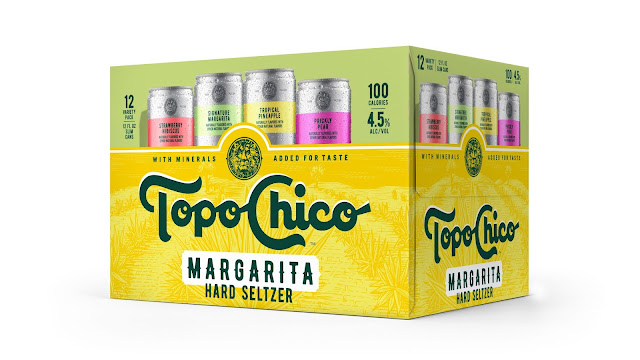Warren v. Coca-Cola Co., 2023 WL 3055196, No. 22-CV-6907 (CS) (S.D.N.Y. Apr. 21, 2023)
Defendant makes Topo Chico “Margarita Hard Seltzer.” It
doesn’t have any tequila in it, though it is made with agave sugars. The front
label contains the brand name “Topo Chico,” the word “Margarita,” and the
phrase “Hard Seltzer.” These words appear on a yellow background containing
faint images of agave plants. The label further indicates that the Product is
4.5% alcohol by volume.
 |
| defendant's package |
Warren alleged that “[c]onsumers expect to receive a cocktail containing tequila when they order a margarita as this ingredient defines what a margarita is,” “[c]onsumers will expect the Product to contain tequila.” The use of “Hard Seltzer” allegedly reinforced that expectation, as “the term ‘hard’ in the context of alcohol refers to distilled spirits, i.e., ‘hard liquor’ ” like tequila. Nor does the product contain sparkling mineral water sourced in Monterrey, Mexico, which Plaintiff claims “is an essential part of Topo Chico beverages.”
She alleged NY GBL and other related claims. The court
rejected them without leave to amend.
This is a question, at heart, of whether producers can push
the definitions of products in new directions, not different in kind from
whether “chik’n” can be made with all-vegan ingredients; consumers may need to
learn new information, such as that alcoholic “margaritas” may not be made with
tequila, if the definition is not frozen (no pun intended) by regulators.
Tequila: Plaintiff’s allegations were inconsistent with the
label and with common sense. The product didn’t use the word “Margarita” in a
vacuum, and instead states that the Product is a “Margarita Hard Seltzer.” “The
context provided by the term ‘Hard Seltzer’ is critical and fatal to
Plaintiff’s claim.” I didn’t know one couldn’t add tequila to seltzer!
The court: “Hard seltzer is a category of ‘alcoholic
beverages that contain carbonated water, alcohol, and – in most cases fruit
flavors, that have enjoyed skyrocketing popularity in the United States,’ which
reasonable consumers would recognize as a product distinct from cocktails like
margaritas.” How do we know? While plaintiff alleged that “hard” predominantly
refers to distilled spirits, that’s only true for “hard liquor,” not for “hard
cider” or “hard lemonade,” “and a reasonable consumer would understand the same
in the phrase ‘hard seltzer.’” The reasonable meaning here is that, unlike
regular seltzer, this one contains alcohol.
The court also took judicial notice that the product’s labeling
as a “Margarita Hard Seltzer” contrasts sharply with the labels of the BuzzBox
and Dulce Vida “[r]eady to drink ... margarita beverages” identified as
competing alternatives in the complaint:
Those canned beverages are called
“Perfect Margarita” and “Sparkling Margarita” with no additional qualifiers,
and come in packages that describe the contents as “premium cocktails” and
specify that they contain tequila. In contrast, the Product’s labeling does not
refer to it as a cocktail or state that it contains tequila, nor does it
describe the drink solely as any kind of Margarita – perfect, sparkling, or
otherwise. Rather, the Product’s label uses “Margarita” as a modifier of the
term “hard seltzer,” without any reference to cocktails or tequila.
Thus, “margarita” was a reference to taste, as confirmed by
its proximity to flavor varieties on the package. Thus, “a reasonable consumer
viewing the Product’s label as a whole would understand that they were
purchasing a hard seltzer made to taste like a margarita and not a
ready-to-drink margarita cocktail.”
The use of agave images didn’t change anything, since the
product uses an agave-based sweetener.
The court also pointed to the broader “circumstances” of
purchase.
Had [Warren] lived in New York for
any length of time, she would know that cocktails containing hard liquor are
not and cannot be sold in grocery stores. But even assuming that she moved to
New York right before buying the Product, she plainly was familiar with a
margarita cocktail, and surely knew that nobody sells a margarita for $1.50. Further,
cursory observation of the other items on sale in the beverage section of the
ShopRite supermarket where she purchased the Product would have revealed soft
drinks, beer, and hard ciders/lemonades/seltzers, but no hard liquor,
cocktails, or wine.
[Would it be deceptive to sell these cans for $8 in a
theater?]
Even if there was ambiguity created by the front (which the
court thought there wasn’t) the ingredients label on the back, with its lack of
reference to tequila, cured that ambiguity. I’m not sure why continued silence
can cure ambiguity—the ingredient list doesn’t specify the type of alcohol—but the
court thought that here, with “hard seltzer,” that continued silence confirmed
the absence of tequila.
Likewise, Warren’s claim that the use of the Topo Chico
brand name would lead reasonable consumers to believe that it contains
sparkling mineral water sourced from Monterrey, Mexico was not plausible. The
label made no claims that it was manufactured in Mexico or is otherwise
connected to Mexico in any way, or that it contains sparkling mineral water of
any kind; that was just Warren’s belief about the brand. “[A]ny such ambiguity
is quickly resolved after reading the information on the Product’s back label,
which explicitly states that it contains filtered carbonated water that is ‘not
from source’ and certain ‘minerals for taste,’ and that it is produced and
bottled in Milwaukee, Wisconsin.”






No comments:
Post a Comment